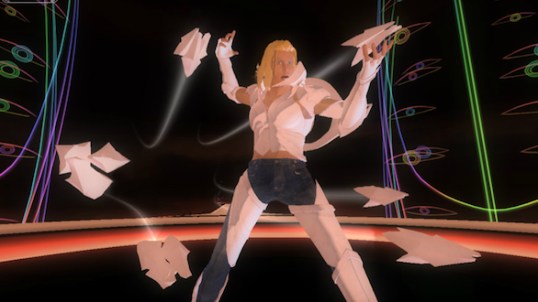In 2011, the Rapture was supposed to come. It didn’t. Instead, we get a video game based on the Bible. Well, sort of.
El Shaddai: Ascension of the Metatron takes its inspiration from the Book of Enoch, an apocryphal text authored centuries before the birth of Christ. Even though it isn’t considered canonical in most Judeo-Christian traditions—except the Ethiopian and Eritrean Orthodox Churches—the Book of Enoch does get referenced in the Old and New Testament.
In El Shaddai‘s version of the Book of Enoch story, angels called the Grigori (or Watchers)—who were supposed to observe and safeguard humans—mate with them, resulting in unholy monsters called Nepheleim. God, of course, doesn’t like this. The Almighty’s right-hand angel Luciphel suggests that in lieu of an apocalypse to wipe the planet clean, one righteous man named Enoch could do battle in His name and defeat the angels. (And, yes, Luciphel later becomes Lucipher.) Enoch makes his way to the Tower of Babel, and finds that the seven major Grigori have created their own realms inside the blasphemous structure. Their idea is outdoing God at the whole world-creation thing. God, of course, doesn’t like this, either.
The would-be holy vision proffered by El Shaddai doesn’t ape Michelangelo or any other medieval masters who codified the look of God, demons or angels. There’s hardly a beard in sight. It channels anime culture and a slick hipsterism into its characters. The overall feel is spare and cool, with Luciphel done up in designer jeans and calling Our Father on a mobile phone. With flowing blond locks, Enoch looks like he could be on Gossip Girl and his armor resembles something out of Fist of the North Star. El Shaddai‘s art direction delivers lush landscapes, no matter whether they’re haunted and barren or kaleidoscopic overloads. You’ll feel like you’re walking through a feverish prophecy.
In contrast to the visual splendor, you’ll encounter a minimalist, one-button fighting mechanic. The rhythm-based combo system means that the more spaced out your button presses are, the more powerful the resulting move is.
One you initially feel your way around it, the fighting becomes something you’ll explore for as long as you play the game. It’s given further depth by the variety of weapons, which you’ll wield in a straightforward hack-and-slash manner. You’ll pick up the blades and bludgeons that Enoch’s angelic enemies drop in battle. However, they degrade with use and will need purification. It’s a miniature religious ritual in the game—holding down a button to clean a weapon with a blooming, heavenly glow—and offers a nice twist on resource management, as well as a thematic grace note to the game’s source material.
article continues on next page…
Parts of El Shaddai do feel annoyingly old-school, though. You’ll endure long stretches of just walk-walk-walking and stumble through level designs in some platforming sections that make it hard gauge your jumps. You’d think God would prep you better against such stupid deaths.
And, hey, should a man in God’s service even be able to die? Even if it’s a video game? How does an updated bible hero come back, without being the Word Made Flesh? El Shaddai finds another clever mechanic to answer that question. If an enemy puts you down for the count, all you need to do is rapidly press the button prompted on-screen to get Enoch back in the fight.
The more you die, the harder it gets but it remains possible if you’re fast enough. It’s another bit of gameplay that feels like religious devotion. Rapidly mashing that button to revive becomes an act of faith, like making the Sign of the Cross over and over as fast as you can to ward off evil.
Ironically, El Shaddai‘s lead designer Sawaki Takeyasu made his name working on fan-favorite, half-devil demon hunter Dante in Capcom’s Devil May Cry series. He then went onto the beloved PS2/GameCube title Okami, which starred wolfen Japanese sun deity Amaterasu. And El Shaddai feels like a game made by a guy with gods and devils on his mind.
But there’s no holy roller agenda here. It’s not even needed. El Shaddai unfolds with Old Testament logic. The bad guys are bad—even if they used to be angelically good—and they evolve in creatures with massive destructive potential. Even if the gameplay doesn’t rise to the same level of the visuals, El Shaddai: Ascension of the Metatron makes other games feel pagan by comparison. Like Jake and Elwood, you’re literally on a mission from God. And while it may feel like purgatory sometimes, it—especially in how the game looks—occasionally approaches something heavenly.
Techland Score: 8.0 out of 10
Evan Narcisse is a reporter at TIME. Find him on Twitter at @EvNarc or on Facebook at Facebook/Evan.Narcisse. You can also continue the discussion on TIME’s Facebook page and on Twitter at @TIME.


